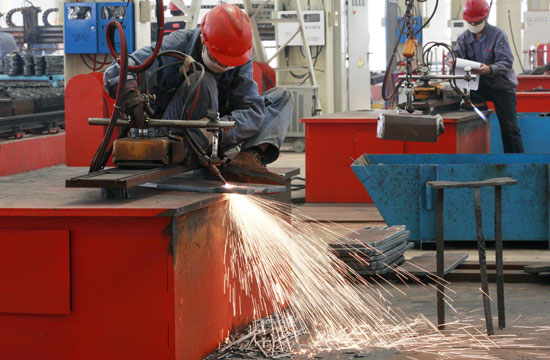Investments approvals gather pace
Updated: 2012-05-29 09:12
By Wei Tian (China Daily)
|
||||||||
Workers at a factory that manufactures equipment for iron and steel mills, in Huaibei, Anhui province. China is moving faster to approve new projects to bolster the country's economy, such as iron and steel projects. [Photo / China Daily]

Faster process highlights govt desire to maintain stable economic growth
China's faster pace of approving investments is raising the expectations that the government will adopt a new round of fiscal stimulus worth up to 2 trillion yuan ($315 billion).
At the same time, though, many fear such short-term measures will further unbalance the country's economy.
The National Development and Reform Commission (NDRC), China's top planning agency, recently approved a 70-billion-yuan steel project that is to be built in Zhanjiang, Guangdong province. The project, which has been delayed eight years since its plans were first submitted for approval, will commence construction in late May.
The Zhanjiang project is only one among many pieces of evidence suggesting the NDRC is speeding up its approval process for large-scale projects. The commission's website said more than 100 projects were approved on May 21 alone, a number equal to the total number of projects approved during the first 20 days of the month.
So many projects in China are now awaiting formal approvals that "local officials are standing in line in front of the commission's Beijing office to get entry permits", the Beijing-based China Times reported.
The report came after Premier Wen Jiabao, speaking at an executive meeting of the State Council on Wednesday, vowed to put a greater priority on maintaining steady economic growth. He said that goal is to be achieved through the use of more monetary fine-tuning and fiscal incentives.
And a recent World Bank report warned of risks to the Chinese economy.
"Considering the already accommodative monetary stance, the burden of any policy support should fall on fiscal policy ... but fiscal stimulus should be less credit-fueled, less local government-funded, and less infrastructure-oriented, unlike the 4-trillion-yuan package in 2008," the report said.
A new round of stimulus spending could inject from 1 trillion yuan to 2 trillion yuan into the Chinese economy, according to Tao Dong, a Hong Kong-based economist with the financial services company Credit Suisse Group AG.
"Central authorities have encouraged local governments to advance the start dates of infrastructure projects that they already have planned," Tao said. "There are also credit lines for railways, subsidies for environmental-protection projects and money for public housing."
"It'll be like a 'mini-me' version of the 2008 stimulus," said Stephen Green, an economist at the international banking company Standard Chartered PLC.
"As of yet, no numbers are attached to the package, but many of the measures appear similar - approval of infrastructure projects, subsidies for consumer goods sales, encouragement of non-budgetary sources of financing," Green said.
But "more investment in production amid a sluggish demand will only exacerbate overcapacity", said Zhang Monan, a researcher with the State Information Center, a think tank.
Zhang said a heedless increase in investing will lead to more cheap credit and is likely to lead local authorities to take on more debt. The upshot will be more non-performing loans in China's banking system.
In November 2008, China unveiled a 4-trillion-yuan stimulus package. That led to about 14 trillion yuan in spending by local governments, Tao said.
Despite the government's attempts to bolster economic growth, China's GDP may slow to 7 percent or "slightly less" in the second quarter this year. In the first quarter, it had been at 8.1 percent.
"These policy stimuli can prevent slides in growth and investment demand, but probably are not enough to prompt a rebound like we saw in 2009," Tao said.
"Although we're again on the path toward investment-driven growth ... this round of stimulus is more or less different from previous ones, since it was accompanied with policies that encourage private investment in industries controlled by monopolies," said Ye Tan, a financial commentator.
"This round of fiscal incentives is more related to having emergency plans amid the ongoing global financial crisis. But in the long term, China should still continue stoking its domestic demand to prevent these investments from leading to overcapacity."
According to a report by the Agricultural Bank of China, the new round of investment should go mainly into infrastructure, since money spent on manufacturing will not bear as much fruit amid depressed domestic and global demand as it would in normal times.
Even so, Shen Minggao, managing director with the Asia-Pacific economic and market analysis department of Citigroup, doubted current stimulus policies will be enough by themselves to reinvigorate growth.
"The government should take more aggressive policy measures to prevent a faster-than-expected economic contraction," Shen said.
Chen Jia and Bloomberg News contributed to this story.
weitian@chinadaily.com.cn

 Relief reaches isolated village
Relief reaches isolated village
 Rainfall poses new threats to quake-hit region
Rainfall poses new threats to quake-hit region
 Funerals begin for Boston bombing victims
Funerals begin for Boston bombing victims
 Quake takeaway from China's Air Force
Quake takeaway from China's Air Force
 Obama celebrates young inventors at science fair
Obama celebrates young inventors at science fair
 Earth Day marked around the world
Earth Day marked around the world
 Volunteer team helping students find sense of normalcy
Volunteer team helping students find sense of normalcy
 Ethnic groups quick to join rescue efforts
Ethnic groups quick to join rescue efforts
Most Viewed
Editor's Picks

|

|

|

|

|

|
Today's Top News
Health new priority for quake zone
Xi meets US top military officer
Japan's boats driven out of Diaoyu
China mulls online shopping legislation
Bird flu death toll rises to 22
Putin appoints new ambassador to China
Japanese ships blocked from Diaoyu Islands
Inspired by Guan, more Chinese pick up golf
US Weekly

|

|






